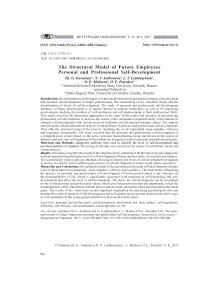The structural model of future employees'' Personal and professional self-development
Автор: Garanina Zhanna G., Andronova Natalia V., Lashmaykina Lyudmila I., Maltseva Olga E., Polyakov Osip Е.
Журнал: Интеграция образования @edumag-mrsu
Рубрика: Международный опыт интеграции образования
Статья в выпуске: 4 (89), 2017 года.
Бесплатный доступ
Introduction: the main purpose of this paper is to present the theoretical and practical aspects of professional and personal self-development of future professionals, the construction of the structural model and the determination of levels of self-development. The study of personal and professional self-development attributes of future professionals is of special interest to modern researchers, as well as for practicing psychologists studying the problem of self-realization and self-improvement in their professional fields. This article discusses the theoretical approaches to the study of the model and structure of personal and professional self-development. It analyses the results of the comparative empirical study of the features of students self-development with various levels of formation of motivational-semantic sphere. The authors carried out the detailed theoretical analysis of the problem of personal and professional self-development. They offer the structural model of the process, including the set of interrelated value-semantic, reflexive and regulatory components. The study revealed that the personal and professional self-development is a comprehensive system based on the active personal transformation being carried out in the course of behavior and activities self-regulation of their behavior, designed to achieve personal and professional goals. Materials and Methods: diagnostic methods were used to identify the level of self-development and personal qualities of students. Processing of the data was carried out by means of correlation, factor and cluster analysis. Results: this article considers the results of the empirical study conducted with the help of psycho-diagnostic methods aimed at identifying the level of self-development of future professionals, its structure and features. The scientifically valid results are obtained, allowing to identify the levels of self-development of students as well as to identify factors affecting the process of self-development of future social sphere specialists. Discussion and Conclusions: the structural model of the personal-professional self-development includes a set of interconnected components: value-semantic, reflexive and regulative. The main factor influencing the process of personal and professional self-development of future professionals is the indicator of the meaningfulness of life, which is significantly associated with readiness to self-knowledge and self-development and affect the level of self-development. The desire for self-development can be considered as one of the personal and professional values, which give future professionals the opportunity to feel the meaningfulness of life, satisfaction with the process and its results, and achieve their personal and professional goals. The results of this study have several important implication for practicing psychologists who can broaden the scope of research of self-development and self-identity processes and determine the basic ways of self-realization of the young people potential in their professional career.
Personal and professional self-development, motivation and sense sphere, self-regulation, reflection, self-efficacy, self-actualisation, meaningfulness of life
Короткий адрес: https://sciup.org/147137230
IDR: 147137230 | DOI: 10.15507/1991-9468.089.021.201704.596-608
Список литературы The structural model of future employees'' Personal and professional self-development
- Цукерман Г. А. Эффективность отечественного образования//Экономика образования. 2010. № 2. С. 62-69. URL: http://elibrary.ru/contents.asp?issueid=873519 (дата обращения: 23.06.2017).
- Rogers C. R. The process of therapy//Journal of Consulting and Clinical Psychology. 1992. No. 60. Pp. 163-164. URL: https://elibrary.ru/item.asp?id=8700138 (дата обращения: 23.06.2017).
- Ryan R. M., Deci E. L. Self-determination theory and the facilitation of intrinsic motivation, social development, and well-being//American Psychologist. 2000. Vol. 55, no. 1. Pp. 68-78. URL: http://citeseerx. ist.psu.edu/viewdoc/download?doi=10.1.1.529.4370&rep=rep1&type=pdf (дата обращения: 23.06.2017).
- Rychlak J. F. Relationship theory: an historical development in psychology leading to a teleological image of humanity//Journal of Social and Personal Relationships. 1984. Vol. 1, no. 3. Pp. 363-386 DOI: 10.1177/0265407584013009
- Knudson-Martin C. Differentiation and self-development in the relationship context//Family Journal. 1996. Vol. 4, no. 3. Pp. 188-198 DOI: 10.1177/1066480796043002
- Kapadia Sh., Miller J. Parent-adolescent relationships in the context of interpersonal disagreements, view from a collective culture//Psychology and Developing Societies. 2005. Vol. 17, no. 1. Pp. 33-50 DOI: 10.1177/097133360501700103
- Tomassini M., Zanazzi S. Reflexivity and self-development of competencies as key drivers in individuals' learning and career paths: cases from Italy//Research in Comparative and International Education. 2014. Vol. 9, no. 3. Pp. 301-312 DOI: 10.2304/rcie.2014.9.3.30
- Stansfield L. M. Is self-development the key to the future? Participant views of self-directed and experiential learning methods//Management Learning. 1996. Vol. 27, no. 40. Pp. 429-445 DOI: 10.1177/1350507696274003
- Yip K. Sh. Self-reflection in reflective practice: a note of caution//British Journal of Social Work. 2006. Vol. 36, no. 5. Pp. 77 DOI: 10.1093/bjsw/bch323
- Super D. E. Vocational development theory: Persons, positions, and processes//The Counseling Psychologist. 1969. Vol. 1, no. 1. Pp. 2-6 DOI: 10.1177/001100006900100101
- Маралов В. Г. Диалектическая взаимосвязь форм саморазвития в контексте решения проблем психологического сопровождения личности//Интеграция образования. 2015. T. 19, №. 2. С. 117-125 DOI: 10.15507/Inted.079.019.201502.117
- Маралов В. Г., Низовских Н. А. Стратегия самосовершенствования в личностном саморазвитии человека//Вестник гуманитарного образования. 2015. № 1. С. 34-39. URL: https://elibrary.ru/item. asp?id=26552227 (дата обращения: 26.06.2017).
- Иванова И. В., Шульман М. Г. Научные представления о саморазвитии личности: философский аспект//Вестник образовательного консорциума. Сер.: Гуманитарные науки. 2014. № 3. С. 57-60. URL: http://www.vestnik-university.com/archives/p13_sectionid/3 (дата обращения: 26.06.2017).
- Селиванова Л. И. Выраженность потребности в саморазвитии у учащейся и студенческой молодежи//Вестник Полоцкого государственного университета. Сер. E: Педагогические науки. 2015. № 7. С. 26-29. URL: http://www.psu.by/index.php/vestnik-pgu/2015-god/9176-vestnik-pgu-7-serija-e-pedagogicheskie-nauki-2015g.html (дата обращения: 26.06.2017).
- Фризен М. А. Субъектность формирующейся личности в плане саморазвития//Вестник Кемеровского государственного университета. 2016. № 2. С. 136-139 DOI: 10.1234/XXXX-XXXX-2016-2-136-139
- Деркач А. А., Сайко Э. В. Потребность в самореализации как феномен социального мира и основание акмеологического развития//Мир психологии. 2008. № 1. С. 218-229. URL: http://psyjournals. ru/mpsi_worldpsy/2008/n1/27688.shtml (дата обращения: 23.06.2017).
- Крупенина Н. С. Саморазвитие и самореализация личности в акмеологии//Акмеология. 2016. № S1 (57). С. 68. URL: http://acmeology.elpub.ru/jour/article/download/984/353 (дата обращения: 23.06.2017).
- Гаранина Ж. Г. Детерминанты профессионального саморазвития будущих специалистов//Интеграция образования. 2014. Т. 18, № 2. C. 25-31 DOI: 10.15507/Inted.075.018.201402.025


